Assignment 302: Dental Care Barriers and Patient Treatment
VerifiedAdded on 2022/09/27
|7
|1596
|25
Homework Assignment
AI Summary
This assignment, completed by a dental nurse, addresses the barriers patients face when accessing dental care and the factors that contribute to patient anxiety. It examines how financial constraints, difficulties in accessing services, and work/family commitments can impede treatment. The assignment further explores how patient expectations, general health issues, and pain affect treatment plans. It also delves into anxieties stemming from past experiences, fear, pre-existing mental health conditions, and risks associated with dental radiography, analyzing their impact on patient care. The solution provides a comprehensive overview of the challenges encountered in dental care and how these challenges influence the development and execution of treatment plans, referencing relevant literature to support its findings.

Dental Nurse
Name
Course
Instructor
Date
Name
Course
Instructor
Date
Paraphrase This Document
Need a fresh take? Get an instant paraphrase of this document with our AI Paraphraser
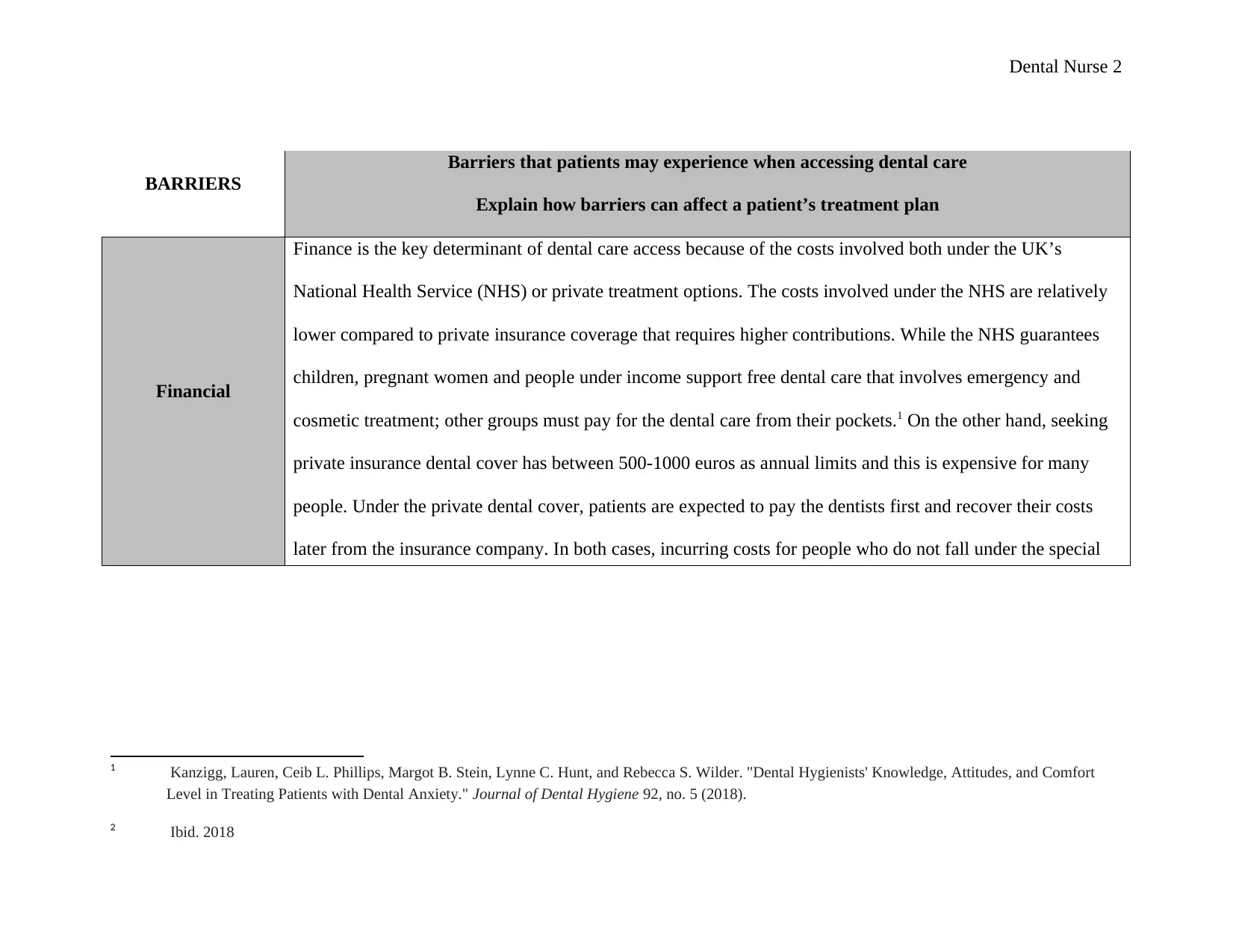
Dental Nurse 2
BARRIERS
Barriers that patients may experience when accessing dental care
Explain how barriers can affect a patient’s treatment plan
Financial
Finance is the key determinant of dental care access because of the costs involved both under the UK’s
National Health Service (NHS) or private treatment options. The costs involved under the NHS are relatively
lower compared to private insurance coverage that requires higher contributions. While the NHS guarantees
children, pregnant women and people under income support free dental care that involves emergency and
cosmetic treatment; other groups must pay for the dental care from their pockets.1 On the other hand, seeking
private insurance dental cover has between 500-1000 euros as annual limits and this is expensive for many
people. Under the private dental cover, patients are expected to pay the dentists first and recover their costs
later from the insurance company. In both cases, incurring costs for people who do not fall under the special
category must part with some cash. Failure to have some money means delayed or irregular implementation of
1 Kanzigg, Lauren, Ceib L. Phillips, Margot B. Stein, Lynne C. Hunt, and Rebecca S. Wilder. "Dental Hygienists' Knowledge, Attitudes, and Comfort
Level in Treating Patients with Dental Anxiety." Journal of Dental Hygiene 92, no. 5 (2018).
2 Ibid. 2018
BARRIERS
Barriers that patients may experience when accessing dental care
Explain how barriers can affect a patient’s treatment plan
Financial
Finance is the key determinant of dental care access because of the costs involved both under the UK’s
National Health Service (NHS) or private treatment options. The costs involved under the NHS are relatively
lower compared to private insurance coverage that requires higher contributions. While the NHS guarantees
children, pregnant women and people under income support free dental care that involves emergency and
cosmetic treatment; other groups must pay for the dental care from their pockets.1 On the other hand, seeking
private insurance dental cover has between 500-1000 euros as annual limits and this is expensive for many
people. Under the private dental cover, patients are expected to pay the dentists first and recover their costs
later from the insurance company. In both cases, incurring costs for people who do not fall under the special
category must part with some cash. Failure to have some money means delayed or irregular implementation of
1 Kanzigg, Lauren, Ceib L. Phillips, Margot B. Stein, Lynne C. Hunt, and Rebecca S. Wilder. "Dental Hygienists' Knowledge, Attitudes, and Comfort
Level in Treating Patients with Dental Anxiety." Journal of Dental Hygiene 92, no. 5 (2018).
2 Ibid. 2018
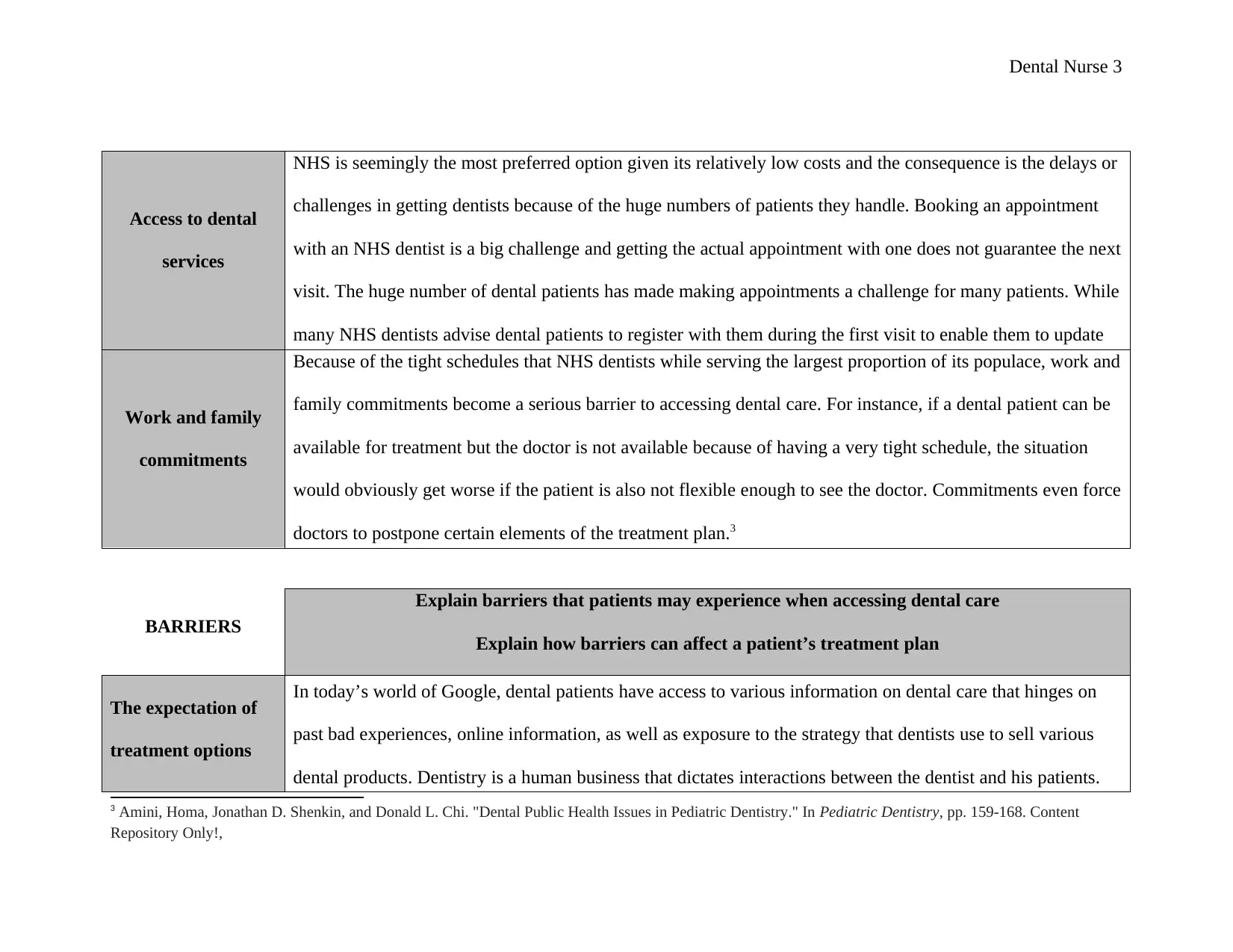
Dental Nurse 3
Access to dental
services
NHS is seemingly the most preferred option given its relatively low costs and the consequence is the delays or
challenges in getting dentists because of the huge numbers of patients they handle. Booking an appointment
with an NHS dentist is a big challenge and getting the actual appointment with one does not guarantee the next
visit. The huge number of dental patients has made making appointments a challenge for many patients. While
many NHS dentists advise dental patients to register with them during the first visit to enable them to update
their details in their databases for future a visit that in itself is still not a guarantee. Delays in booking
Work and family
commitments
Because of the tight schedules that NHS dentists while serving the largest proportion of its populace, work and
family commitments become a serious barrier to accessing dental care. For instance, if a dental patient can be
available for treatment but the doctor is not available because of having a very tight schedule, the situation
would obviously get worse if the patient is also not flexible enough to see the doctor. Commitments even force
doctors to postpone certain elements of the treatment plan.3
BARRIERS
Explain barriers that patients may experience when accessing dental care
Explain how barriers can affect a patient’s treatment plan
The expectation of
treatment options
In today’s world of Google, dental patients have access to various information on dental care that hinges on
past bad experiences, online information, as well as exposure to the strategy that dentists use to sell various
dental products. Dentistry is a human business that dictates interactions between the dentist and his patients.
3 Amini, Homa, Jonathan D. Shenkin, and Donald L. Chi. "Dental Public Health Issues in Pediatric Dentistry." In Pediatric Dentistry, pp. 159-168. Content
Repository Only!,
Access to dental
services
NHS is seemingly the most preferred option given its relatively low costs and the consequence is the delays or
challenges in getting dentists because of the huge numbers of patients they handle. Booking an appointment
with an NHS dentist is a big challenge and getting the actual appointment with one does not guarantee the next
visit. The huge number of dental patients has made making appointments a challenge for many patients. While
many NHS dentists advise dental patients to register with them during the first visit to enable them to update
their details in their databases for future a visit that in itself is still not a guarantee. Delays in booking
Work and family
commitments
Because of the tight schedules that NHS dentists while serving the largest proportion of its populace, work and
family commitments become a serious barrier to accessing dental care. For instance, if a dental patient can be
available for treatment but the doctor is not available because of having a very tight schedule, the situation
would obviously get worse if the patient is also not flexible enough to see the doctor. Commitments even force
doctors to postpone certain elements of the treatment plan.3
BARRIERS
Explain barriers that patients may experience when accessing dental care
Explain how barriers can affect a patient’s treatment plan
The expectation of
treatment options
In today’s world of Google, dental patients have access to various information on dental care that hinges on
past bad experiences, online information, as well as exposure to the strategy that dentists use to sell various
dental products. Dentistry is a human business that dictates interactions between the dentist and his patients.
3 Amini, Homa, Jonathan D. Shenkin, and Donald L. Chi. "Dental Public Health Issues in Pediatric Dentistry." In Pediatric Dentistry, pp. 159-168. Content
Repository Only!,
⊘ This is a preview!⊘
Do you want full access?
Subscribe today to unlock all pages.

Trusted by 1+ million students worldwide
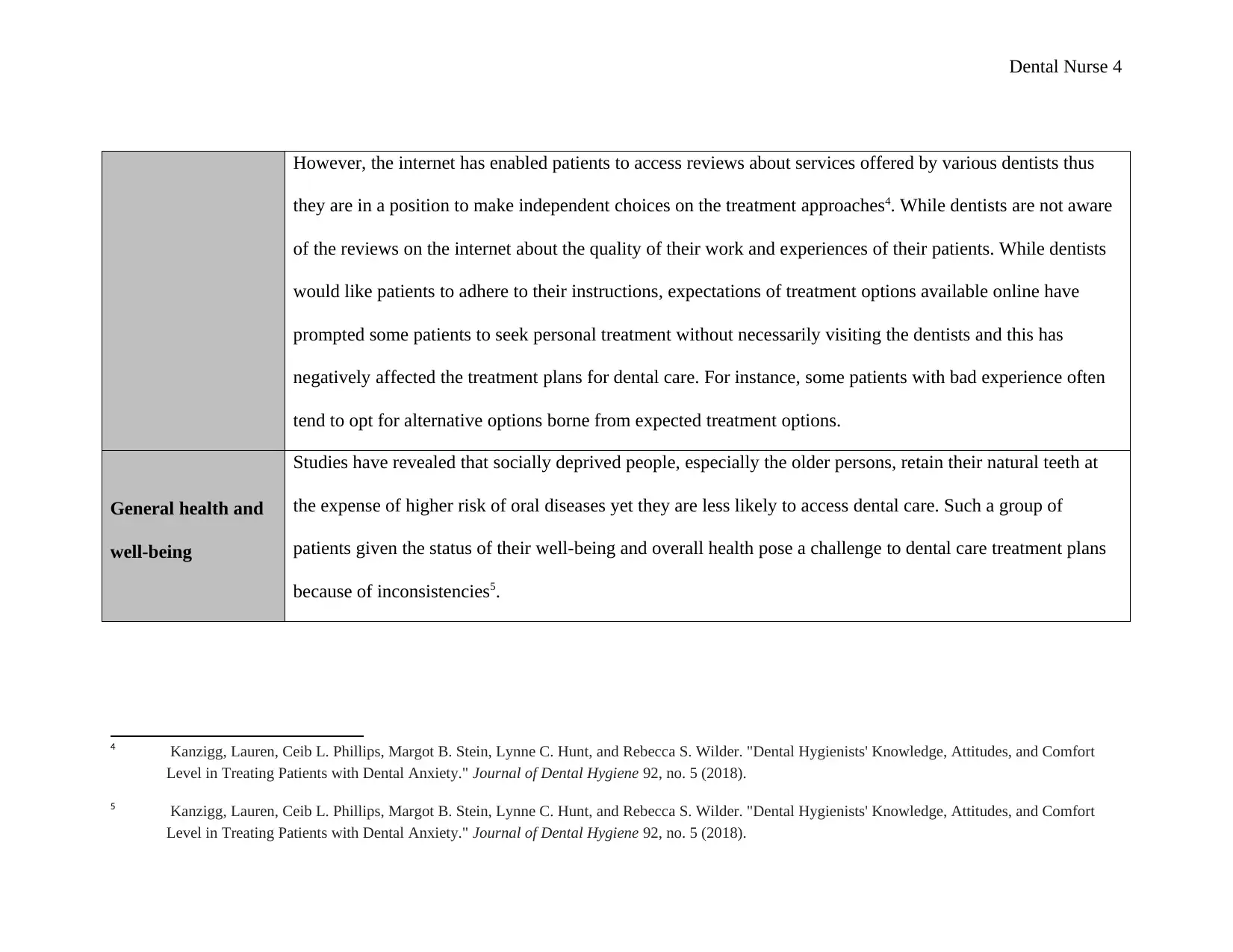
Dental Nurse 4
However, the internet has enabled patients to access reviews about services offered by various dentists thus
they are in a position to make independent choices on the treatment approaches4. While dentists are not aware
of the reviews on the internet about the quality of their work and experiences of their patients. While dentists
would like patients to adhere to their instructions, expectations of treatment options available online have
prompted some patients to seek personal treatment without necessarily visiting the dentists and this has
negatively affected the treatment plans for dental care. For instance, some patients with bad experience often
tend to opt for alternative options borne from expected treatment options.
General health and
well-being
Studies have revealed that socially deprived people, especially the older persons, retain their natural teeth at
the expense of higher risk of oral diseases yet they are less likely to access dental care. Such a group of
patients given the status of their well-being and overall health pose a challenge to dental care treatment plans
because of inconsistencies5.
4 Kanzigg, Lauren, Ceib L. Phillips, Margot B. Stein, Lynne C. Hunt, and Rebecca S. Wilder. "Dental Hygienists' Knowledge, Attitudes, and Comfort
Level in Treating Patients with Dental Anxiety." Journal of Dental Hygiene 92, no. 5 (2018).
5 Kanzigg, Lauren, Ceib L. Phillips, Margot B. Stein, Lynne C. Hunt, and Rebecca S. Wilder. "Dental Hygienists' Knowledge, Attitudes, and Comfort
Level in Treating Patients with Dental Anxiety." Journal of Dental Hygiene 92, no. 5 (2018).
However, the internet has enabled patients to access reviews about services offered by various dentists thus
they are in a position to make independent choices on the treatment approaches4. While dentists are not aware
of the reviews on the internet about the quality of their work and experiences of their patients. While dentists
would like patients to adhere to their instructions, expectations of treatment options available online have
prompted some patients to seek personal treatment without necessarily visiting the dentists and this has
negatively affected the treatment plans for dental care. For instance, some patients with bad experience often
tend to opt for alternative options borne from expected treatment options.
General health and
well-being
Studies have revealed that socially deprived people, especially the older persons, retain their natural teeth at
the expense of higher risk of oral diseases yet they are less likely to access dental care. Such a group of
patients given the status of their well-being and overall health pose a challenge to dental care treatment plans
because of inconsistencies5.
4 Kanzigg, Lauren, Ceib L. Phillips, Margot B. Stein, Lynne C. Hunt, and Rebecca S. Wilder. "Dental Hygienists' Knowledge, Attitudes, and Comfort
Level in Treating Patients with Dental Anxiety." Journal of Dental Hygiene 92, no. 5 (2018).
5 Kanzigg, Lauren, Ceib L. Phillips, Margot B. Stein, Lynne C. Hunt, and Rebecca S. Wilder. "Dental Hygienists' Knowledge, Attitudes, and Comfort
Level in Treating Patients with Dental Anxiety." Journal of Dental Hygiene 92, no. 5 (2018).
Paraphrase This Document
Need a fresh take? Get an instant paraphrase of this document with our AI Paraphraser
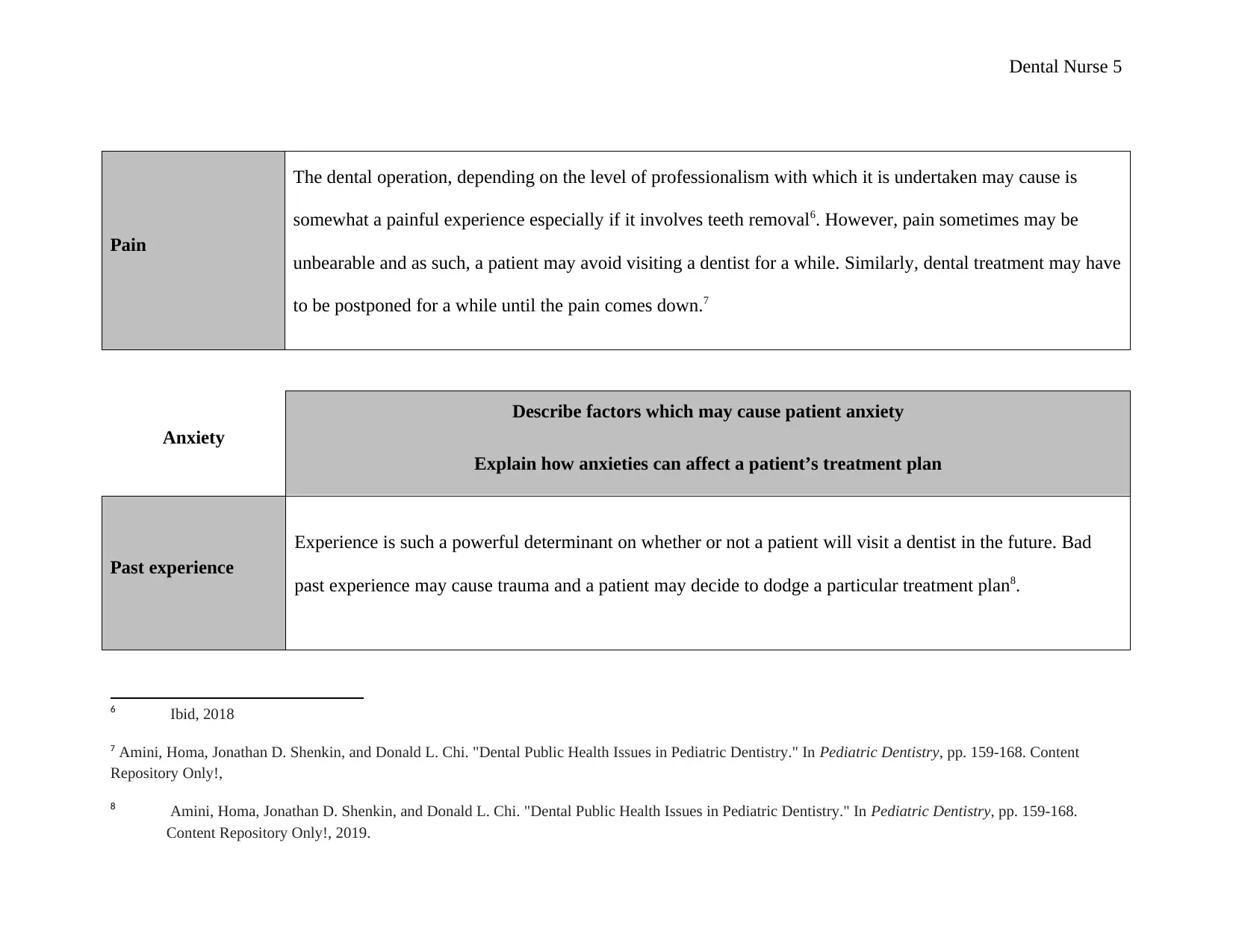
Dental Nurse 5
Pain
The dental operation, depending on the level of professionalism with which it is undertaken may cause is
somewhat a painful experience especially if it involves teeth removal6. However, pain sometimes may be
unbearable and as such, a patient may avoid visiting a dentist for a while. Similarly, dental treatment may have
to be postponed for a while until the pain comes down.7
Anxiety
Describe factors which may cause patient anxiety
Explain how anxieties can affect a patient’s treatment plan
Past experience
Experience is such a powerful determinant on whether or not a patient will visit a dentist in the future. Bad
past experience may cause trauma and a patient may decide to dodge a particular treatment plan8.
6 Ibid, 2018
7 Amini, Homa, Jonathan D. Shenkin, and Donald L. Chi. "Dental Public Health Issues in Pediatric Dentistry." In Pediatric Dentistry, pp. 159-168. Content
Repository Only!,
8 Amini, Homa, Jonathan D. Shenkin, and Donald L. Chi. "Dental Public Health Issues in Pediatric Dentistry." In Pediatric Dentistry, pp. 159-168.
Content Repository Only!, 2019.
Pain
The dental operation, depending on the level of professionalism with which it is undertaken may cause is
somewhat a painful experience especially if it involves teeth removal6. However, pain sometimes may be
unbearable and as such, a patient may avoid visiting a dentist for a while. Similarly, dental treatment may have
to be postponed for a while until the pain comes down.7
Anxiety
Describe factors which may cause patient anxiety
Explain how anxieties can affect a patient’s treatment plan
Past experience
Experience is such a powerful determinant on whether or not a patient will visit a dentist in the future. Bad
past experience may cause trauma and a patient may decide to dodge a particular treatment plan8.
6 Ibid, 2018
7 Amini, Homa, Jonathan D. Shenkin, and Donald L. Chi. "Dental Public Health Issues in Pediatric Dentistry." In Pediatric Dentistry, pp. 159-168. Content
Repository Only!,
8 Amini, Homa, Jonathan D. Shenkin, and Donald L. Chi. "Dental Public Health Issues in Pediatric Dentistry." In Pediatric Dentistry, pp. 159-168.
Content Repository Only!, 2019.
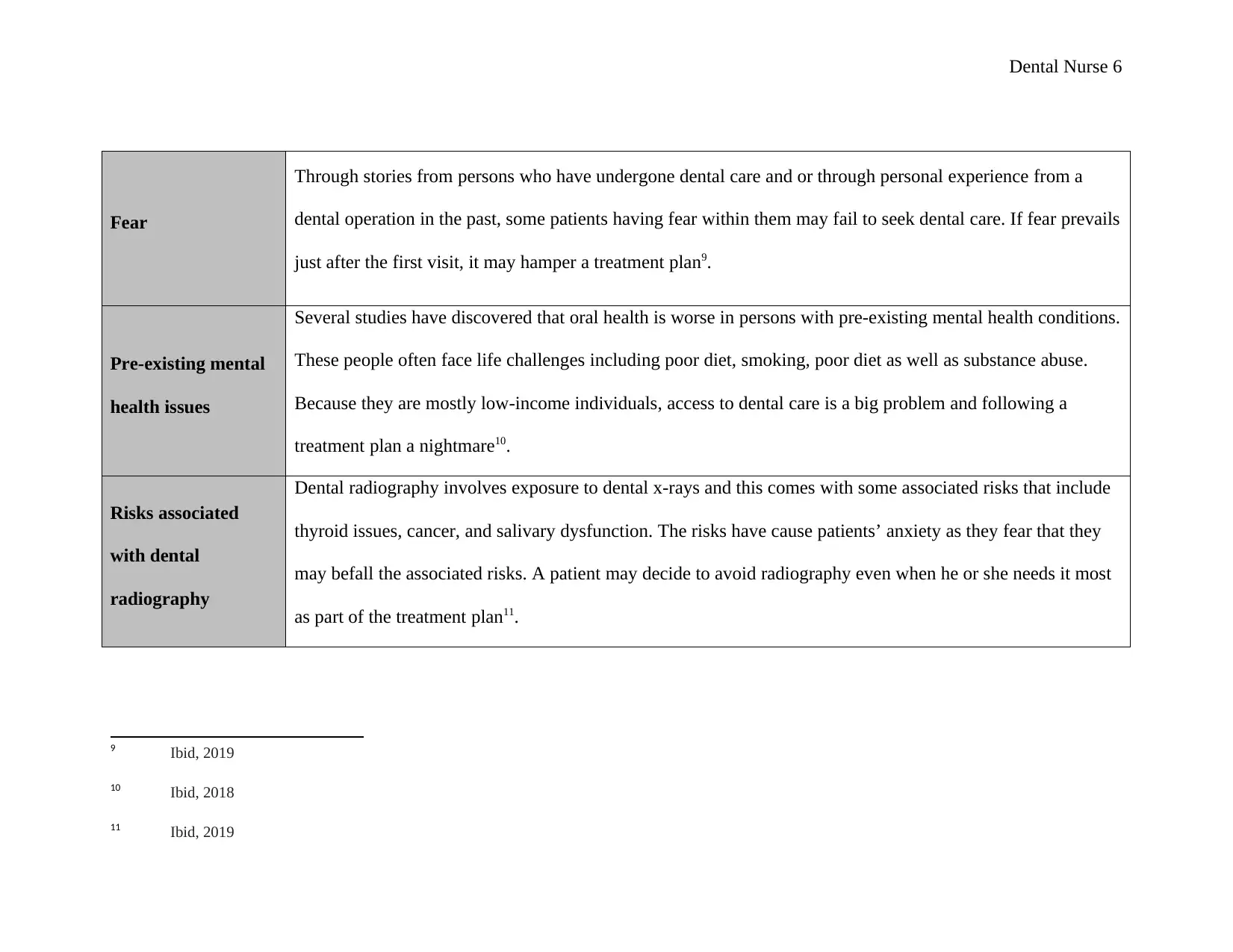
Dental Nurse 6
Fear
Through stories from persons who have undergone dental care and or through personal experience from a
dental operation in the past, some patients having fear within them may fail to seek dental care. If fear prevails
just after the first visit, it may hamper a treatment plan9.
Pre-existing mental
health issues
Several studies have discovered that oral health is worse in persons with pre-existing mental health conditions.
These people often face life challenges including poor diet, smoking, poor diet as well as substance abuse.
Because they are mostly low-income individuals, access to dental care is a big problem and following a
treatment plan a nightmare10.
Risks associated
with dental
radiography
Dental radiography involves exposure to dental x-rays and this comes with some associated risks that include
thyroid issues, cancer, and salivary dysfunction. The risks have cause patients’ anxiety as they fear that they
may befall the associated risks. A patient may decide to avoid radiography even when he or she needs it most
as part of the treatment plan11.
9 Ibid, 2019
10 Ibid, 2018
11 Ibid, 2019
Fear
Through stories from persons who have undergone dental care and or through personal experience from a
dental operation in the past, some patients having fear within them may fail to seek dental care. If fear prevails
just after the first visit, it may hamper a treatment plan9.
Pre-existing mental
health issues
Several studies have discovered that oral health is worse in persons with pre-existing mental health conditions.
These people often face life challenges including poor diet, smoking, poor diet as well as substance abuse.
Because they are mostly low-income individuals, access to dental care is a big problem and following a
treatment plan a nightmare10.
Risks associated
with dental
radiography
Dental radiography involves exposure to dental x-rays and this comes with some associated risks that include
thyroid issues, cancer, and salivary dysfunction. The risks have cause patients’ anxiety as they fear that they
may befall the associated risks. A patient may decide to avoid radiography even when he or she needs it most
as part of the treatment plan11.
9 Ibid, 2019
10 Ibid, 2018
11 Ibid, 2019
⊘ This is a preview!⊘
Do you want full access?
Subscribe today to unlock all pages.

Trusted by 1+ million students worldwide
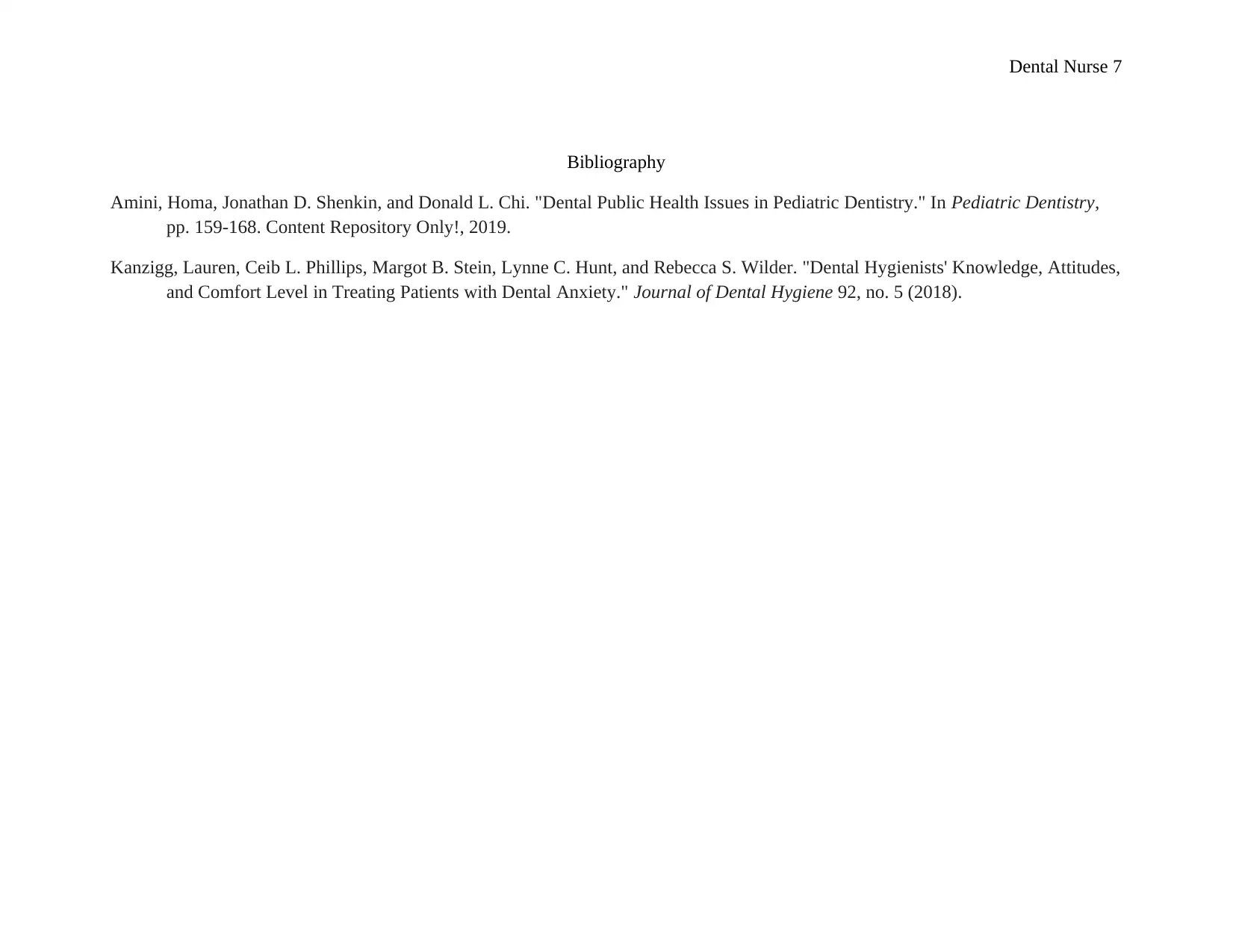
Dental Nurse 7
Bibliography
Amini, Homa, Jonathan D. Shenkin, and Donald L. Chi. "Dental Public Health Issues in Pediatric Dentistry." In Pediatric Dentistry,
pp. 159-168. Content Repository Only!, 2019.
Kanzigg, Lauren, Ceib L. Phillips, Margot B. Stein, Lynne C. Hunt, and Rebecca S. Wilder. "Dental Hygienists' Knowledge, Attitudes,
and Comfort Level in Treating Patients with Dental Anxiety." Journal of Dental Hygiene 92, no. 5 (2018).
Bibliography
Amini, Homa, Jonathan D. Shenkin, and Donald L. Chi. "Dental Public Health Issues in Pediatric Dentistry." In Pediatric Dentistry,
pp. 159-168. Content Repository Only!, 2019.
Kanzigg, Lauren, Ceib L. Phillips, Margot B. Stein, Lynne C. Hunt, and Rebecca S. Wilder. "Dental Hygienists' Knowledge, Attitudes,
and Comfort Level in Treating Patients with Dental Anxiety." Journal of Dental Hygiene 92, no. 5 (2018).
1 out of 7
Related Documents
Your All-in-One AI-Powered Toolkit for Academic Success.
+13062052269
info@desklib.com
Available 24*7 on WhatsApp / Email
![[object Object]](/_next/static/media/star-bottom.7253800d.svg)
Unlock your academic potential
Copyright © 2020–2025 A2Z Services. All Rights Reserved. Developed and managed by ZUCOL.




